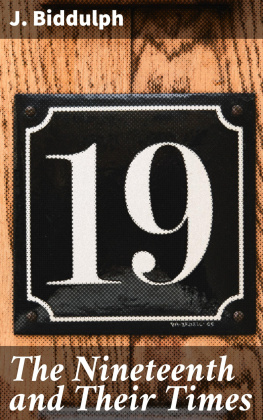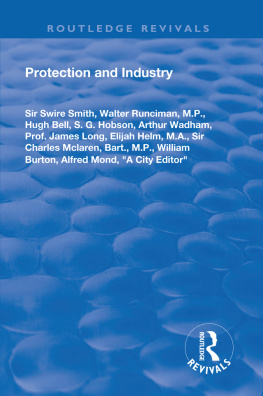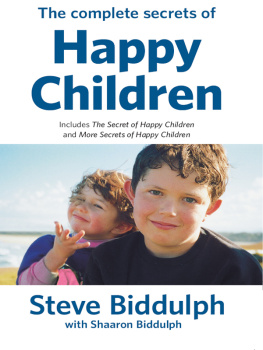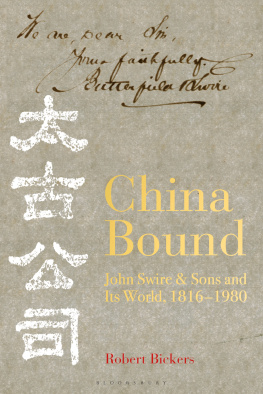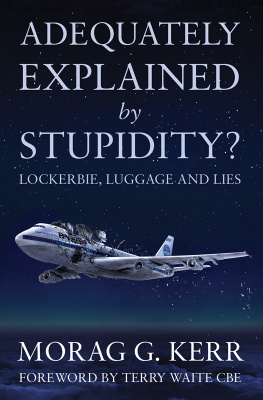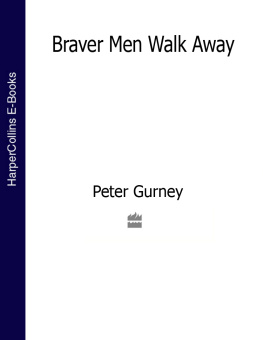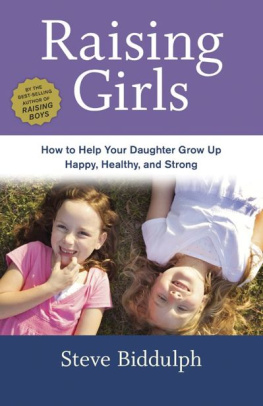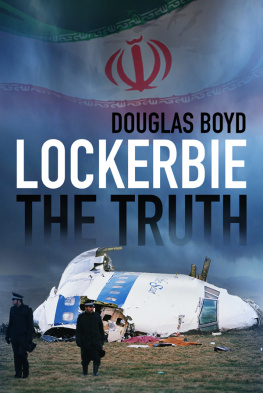Jim Swire and Peter Biddulph - The Lockerbie Bombing
Here you can read online Jim Swire and Peter Biddulph - The Lockerbie Bombing full text of the book (entire story) in english for free. Download pdf and epub, get meaning, cover and reviews about this ebook. year: 2021, publisher: Birlinn Limited, genre: Home and family. Description of the work, (preface) as well as reviews are available. Best literature library LitArk.com created for fans of good reading and offers a wide selection of genres:
Romance novel
Science fiction
Adventure
Detective
Science
History
Home and family
Prose
Art
Politics
Computer
Non-fiction
Religion
Business
Children
Humor
Choose a favorite category and find really read worthwhile books. Enjoy immersion in the world of imagination, feel the emotions of the characters or learn something new for yourself, make an fascinating discovery.
- Book:The Lockerbie Bombing
- Author:
- Publisher:Birlinn Limited
- Genre:
- Year:2021
- Rating:4 / 5
- Favourites:Add to favourites
- Your mark:
- 80
- 1
- 2
- 3
- 4
- 5
The Lockerbie Bombing: summary, description and annotation
We offer to read an annotation, description, summary or preface (depends on what the author of the book "The Lockerbie Bombing" wrote himself). If you haven't found the necessary information about the book — write in the comments, we will try to find it.
The Lockerbie Bombing — read online for free the complete book (whole text) full work
Below is the text of the book, divided by pages. System saving the place of the last page read, allows you to conveniently read the book "The Lockerbie Bombing" online for free, without having to search again every time where you left off. Put a bookmark, and you can go to the page where you finished reading at any time.
Font size:
Interval:
Bookmark:

THE LOCKERBIE BOMBING
LOCKERBIE
BOMBING
A FATHERS SEARCH
FOR JUSTICE
JIM SWIRE
and
PETER BIDDULPH

First published in 2021 by
Birlinn Limited
West Newington House
10 Newington Road
Edinburgh
EH9 1QS
www.birlinn.co.uk
Copyright Jim Swire and Peter Biddulph 2021
ISBN 978 1 78027 648 9
ePUB ISBN 978 1 78885 305 7
The right of Jim Swire and Peter Biddulph to be identified as Authors of this work has been asserted by them in accordance with the Copyright, Designs and Patents Act 1988.
All rights reserved. No part of this publication may be reproduced in any form or by any means without permission from the publisher.
British Library Cataloguing in Publication Data
A catalogue record for this book is available from the British Library

Designed and typeset by Hewer Text UK Ltd, Edinburgh Printed and bound by Bell & Bain Ltd, Glasgow
For Flora and all who seek Truth
THE WITNESSES WHO appear in this account from
THIS BOOK IS partly the story of over thirty years of my life. Although of course it centres on the aftermath of the Lockerbie disaster, I believe it also has to be set in some autobiographical context. How could initial faith in the establishment take thirty years to convert into distrust towards all those touched by that addictive drug we call power?
One of my most vivid memories of early life comes from 1940 when I was five, crossing the Atlantic in a convoy, my father having been recalled to Britain after running the British garrison in Bermuda on the outbreak of war. He was an officer in the Royal Engineers and a man of principle of whom I was already deeply in awe. He and my mother Otta (ne Tarn), and my elder sister Flora, were listening to words of defiance from Winston Churchill, speaking over the ships Tannoy: England would never surrender. What made it so memorable was that they were totally absorbed by that defiant and powerful rhetoric; it cut them off from the reality around them. I think that if a torpedo had chosen that moment to strike, they would have stayed exactly where they were to the end.
My parents had married late in their thirties and were steeped in the mores of the late Victorian era. In our households there were two communities, upstairs and down. Parents inhabited the drawing room, and we children were sent to fraternise with them with brushed hair and on best behaviour for an hour in the evening.
Once we were back in the UK, my father, Colonel Roger Swire, was away most of the time fighting WWII. I believe his psyche had been forever altered by his experience of the Great War as a young Royal Engineer subaltern aged seventeen he was sent on a horse and with a sabre to the trenches, winning a MC and Bar, but witnessing the mayhem of machine-gun bullets churning the mud of the parapets and sometimes the flesh of his men. One of the worst experiences seems to have been when playing tennis behind the lines with his best friend, the friend was shot dead on court by a sniper. None of these things would he ever mention himself. Meanwhile, Otta had to run the family on her own and apply the discipline that the Colonel would have required.
Looking back later, I wonder what it cost him to teach me to use a gun in Skye, or what memories were evoked for him when he and I used to go out onto the moors there in winter with lengths of wire to repair the phone lines blown off their poles by storms.
When the family settled into Orbost House in Skye in 1947, one of my regular tasks was to trim the wicks and clean the chimneys of the ordinary paraffin lamps, and to fill and pump up the tanks of the Tilley pressure-driven lamps which alone were powerful enough to light an entire space the size of the drawing room. The hiss of a Tilley and the smell of methylated spirit with which they had to be pre-warmed remain with me still.
It was necessary to ensure that any smell of spilled paraffin was scrubbed off me, and this was always achieved by our nanny, Louisa Macdonald, a Skye lady. She loved my elder sister Flora and myself like a mother and had been with the family from my sisters birth. Both my grandmothers had come from Skye, and it was because of our familys long association with the island that she was recruited from there. She had started with us when our family was billeted at number twenty-four the Cloisters in Windsor Castle, where my sister and I were born. Louie had been with us in Bermuda, braved the Atlantic with us, and had lived to see and love our own children too. Like me, she was hugely in awe of the Colonel.
Sent down to England from the age of seven to stay in the best boarding schools, I think I was being prepared to take on the mantra of a leader. But the role did not fit; I felt I had neither the self-confidence nor the ambition.
School holidays were spent roaming the hills of Skye, bringing home meat and fish for the table. During term time Nanny, who had bought herself a shotgun, made up for shortages in my absence. No doubt my long-isolated hunting treks over the Skye moors, and fishing trips in my homemade single-seat canoe, reinforced my shyness.
National Service as a second-lieutenant in the Royal Engineers in Archbishop Makarioss terrorist infested but beautiful island of Cyprus and in Port Said in the Suez crisis taught me about esprit de corps, plastic explosives, the workings of bombs, the sadness, madness and loss of war, and also about the shapes of organised religion and the power of the financial might of America.
After that came three lovely years reading geology in Cambridge where, on 21 June 1960, I met a delightful young trainee teacher, Jane, and on 16 December 1961 we married: a ceremony which forever transformed my life for the better. Jane is brave, tough and loving. Somehow she knew, twenty-seven years later, after Floras murder, that my campaign was at least in part my way of coping with the loss.
From 1960 I enjoyed my job as a TV technician in the BBC; electronics had been a major hobby, and Auntie reinforced that with a professional training course. But when I finally did decide to read medicine, which meant initial years of penury, Jane backed my decision.
The arrival of our first child, Flora, changed the world for us. Flora was everything a first-born could possibly be. Even on the breast as a baby her eyes were looking around, weighing up her people and her world, full of fun and curiosity, bursting with energy. Soon she had a sister, Cathy, and then a brother, William, and we were a fortunate and happy family. Floras clever hands gave her skills in many hobbies including dressmaking.
Flora had a lovely voice and became an accomplished pianist and skilled guitar player, winning diplomas at music festivals. I vividly remember her singing to her own guitar when she was about ten in a croft house in Skye, with the crofts budgerigars twittering in time to her beat, all of us crammed in around the peat fire. Having worked at the BBC I was into recording, but I still can barely listen now to that cosy evening ceilidh with young Flora singing I dreamed the world had all agreed to put an end to war..., and the words of love and appreciation that her fresh skills had evoked.
Later, Flora decided to study medicine, and I have fond memories of discussions between us about diseases old and new. Like most medical students she went through phases of believing that she had one of the diseases being studied. Once she became worried about a deeply coloured spot on one of her toes: was it a malignant melanoma? After close examination and a few giggles it was clearly not, but she being Flora I had to explain why I was sure that it was not.
Font size:
Interval:
Bookmark:
Similar books «The Lockerbie Bombing»
Look at similar books to The Lockerbie Bombing. We have selected literature similar in name and meaning in the hope of providing readers with more options to find new, interesting, not yet read works.
Discussion, reviews of the book The Lockerbie Bombing and just readers' own opinions. Leave your comments, write what you think about the work, its meaning or the main characters. Specify what exactly you liked and what you didn't like, and why you think so.



